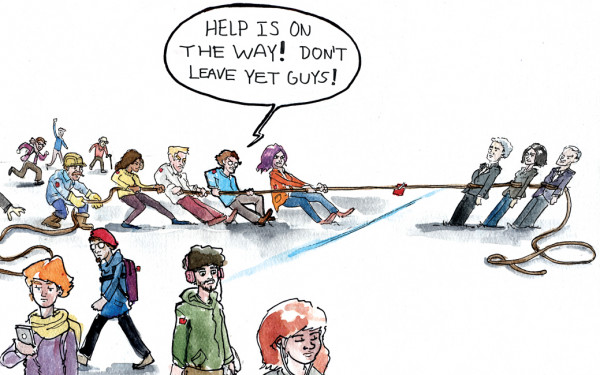Taking Back the Night for Everyone
Annual March Brings Montreal Organizations Together Against Gendered Violence
People of all genders and experiences took back the night on Friday in solidarity against gendered violence that disproportionately affects women.
“Everyone has a right to feel safe and welcome in this space,” Julie Michaud, administrative coordinator at the Centre for Gender Advocacy declared.
The march came amid continued disgust at Montreal police sergeant Laurent Gingras’ comments last month, which provoked a furor of criticism.
He stated that women ought not to travel in taxis alone at night, particularly when intoxicated, or else they risk putting themselves in harms way.
“Why ought the onus be on women to be careful or to remain sober?” attendee Rog Bastain told The Link. “It should be more of a general concept that men should not rape or sexually assault women.”
Attendees voiced concern about the sergeant’s remarks, especially after the police disclosed there had been 17 female victims of assault in taxis this year.
“[What he said was] really unfair, it doesn’t really shed light on the situation or provide any solutions,” Bastain added.
CTV reported this week that there has been a law since 2001 which demands that “any aspiring taxi driver will have to submit to the criminal background check.”
However, this law has “by and large not been enforced by the industry, partly because there has been no province-wide standard for background checks in place,” according to the report from CTV.
Transport Quebec and the City of Montreal have announced their intention to strictly enforce the law starting the first of December. But for the 46 reported victims of abuse from taxi drivers in the past two years it may be too little, too late.
“Rather than denouncing the violence and introducing punitive and preventative measures in place the SPVM instead [suggested women follow several guidelines],” Trampis Hogg and Anaïs Van Vliet, volunteers for the Centre, told the crowd. “This response is infantilizing and misogynistic; it puts blame on victims and perpetuates rape culture.”
Michaud told The Link that the Centre “wants to make Take Back the Night marches more inclusive [by not just making them exclusive to women and children] and acknowledge that gendered violence affects not just women.”
Consequently men, women and transpeople alike participated in the event—although the vast majority of attendees were women between the ages of 18 and 40.
“[I’m here] to show support against rape culture and put the emphasis on people who would sexually assault and rape people,” Bastain said. “It really is a widespread problem which requires a generational solution.”
Take Back the Night is primarily “an event to bring attention to sexual harassment and sexual assault,” Michaud told The Link. “Its name references the kinds of advice women are often given to stay safe at night and avoid sexual assault.”
“In fact being out alone at night is not a contributory factor to sexual assault. When someone is sexually assaulted it is because one person has chosen to sexually assault another,” she continued.
“It might sound a little preposterous, but we need to teach people to not sexually assault each other.”
“It might sound a little preposterous, but we need to teach people to not sexually assault each other.”
2_599_1050_90.jpg)
Several different groups, in addition to the Centre, spoke before and after the march about the many forms of gendered violence. These included Women in Cities International, the Reproductive Justice League Choir, Accessiblize Montreal, Quebec Native Women, and the South Asian Women’s Community Centre.
The Centre elaborated on the violence indigenous women experience, which tends to be a lot more aggressive and common.
In recent years, there has been greater pressure on organizations and institutions to enact policies to provide women with greater protection in a society that systematically discriminates against them.
“Unfortunately, Concordia is, in fact, one of those institutions which is not doing anywhere near enough,” Michaud stated.
The Centre for Gender Advocacy has been asking Concordia to implement mandatory workshops regarding consent, especially for students living in residence.
Recently Concordia president Alan Shepard told The Link that sexual consent workshops might not be effective because “saying it’s mandatory, in my view, actually can diminish its effectiveness.”
Shepard’s comments, according to Michaud, almost implies “sexual consent workshops are considered a punishment [or suggest] that they [the person undertaking the workshop] are a rapist.
“We think this is shameful; they [Concordia] need to take action,” she said. “This is a no-brainer.”
McGill University has held mandatory workshops for its students in residence through the McGill Rez Project for the last eleven years.
Throngs of protesters left Norman Bethune Square and headed east on de Maissoneuve Blvd. W. As they trekked along the promenade in temperatures below -5 C, the crowd chanted, “no means no, wherever we go.”
“What do we want?” exclaimed the sopranos of the crowd in a rhetorical query.
“Safe streets!” the tenors replied. “When do we want it?”
As the lyrical pendulum swung back to the questioners, they responded with a resounding “NOW!”
The crowd made a left onto McGill College Avenue where the protesters reconvened in front of McGill’s Redpath building to listen to two more speakers.
Shortly before the march’s end, the speakers told the crowd anecdotes detailing their experiences of feeling intimidated in male-dominated public environments.

1_900_600_90.jpg)
3_900_600_90.jpg)


2_600_375_90_s_c1.jpg)
.WEB_600_375_90_s_c1.jpg)
